The fall can be a fun time for toddlers. With the weather cooling down, and…
Music is a universal language that has the power to move us, inspire us, and foster a love for creativity and expression from a very young age. At Primary Beginnings, we recognize the importance of music at every stage of life, with an emphasis on early childhood development.
Engaging children in musical activities not only helps them develop a lifelong appreciation for the arts, it also nurtures various skills that are crucial for their overall growth.
The Benefits of Music for Young Children
Music has a profound impact on children's development, from the way they think to the way they feel.
The Relationship Between Development and Music
Music is more than just a form of entertainment; it is a powerful tool that contributes to various developmental milestones in early childhood. Studies have shown that children who participate in music-related activities exhibit improved language acquisition, memory, and spatial-temporal skills. The rhythmic patterns in music mimic the rhythm of language, helping children distinguish sounds, understand patterns, and develop sequencing abilities essential for reading and math.
When you combine music and movement together, you get a multisensory experience that helps with sensory integration. This allows children to process multiple sensory inputs—auditory, visual, and tactile—simultaneously, which is crucial for their overall development.
By engaging different areas of the brain, music can help children develop a more integrated approach to learning and understanding their environment.
10 Musical Activities That Benefit Children
Below are ten of our favorite music activities at Primary Beginnings, each designed to help children explore their musical talents while promoting various developmental skills:
Singing Circle Time
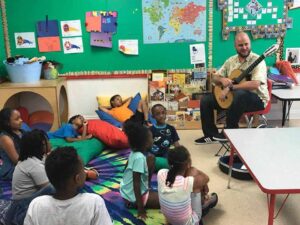
Singing circle time (though you might opt to call it by a different name), involves children gathering in a circle to sing songs, usually while incorporating simple hand movements or clapping. This activity is a staple in early childhood education because it encourages participation and inclusiveness. Children learn to listen, follow along, and even lead their peers, building confidence and a sense of belonging.
This activity promotes language development by exposing children to new vocabulary, rhymes, and rhythms. The repetition of songs helps with memory retention, at the same time that the group setting enhances social skills like turn-taking, listening, and respecting others.
Try this: Songs like “The Wheels on the Bus,” “If You’re Happy and You Know It,” and “Old MacDonald Had a Farm” are popular choices as they are interactive and easy to follow.
Musical Storytelling
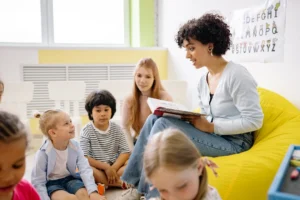
Musical storytelling combines the magic of a good story with the emotional power of music. Teachers can use instruments, songs, and sound effects to bring stories to life, making them more engaging and memorable.
This activity enhances cognitive development by helping children make connections between sounds and events in a story. It also builds comprehension and vocabulary, as children are exposed to new words and phrases. It can even foster emotional intelligence by allowing children to explore different feelings through the story's characters and plot.
Try this: Classic tales like "The Three Little Pigs" or "Goldilocks and the Three Bears" can be enhanced with musical elements like drum rolls for suspense or soft bells for magical moments.
Rhythm Sticks
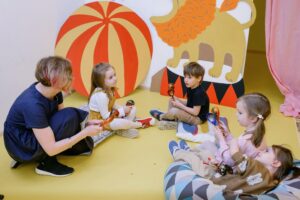
Rhythm sticks and drum sticks are simple percussion instruments that children can use to tap out rhythms. This activity can be done individually, in pairs, or as a group, where children follow along with a song or create their own rhythmic patterns.
Rhythm sticks help develop fine motor skills, hand-eye coordination, and timing. They also encourage concentration and focus as children must listen carefully to maintain the rhythm. The tactile experience of tapping and feeling the rhythm helps with sensory integration.
Try this: Educators can use songs like "We Will Rock You" or “Do You Know the Muffin Man?” to help children tap out the rhythm, or create a rhythm game where children take turns leading.
Instrument Exploration
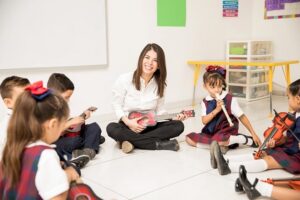
Instrument exploration allows children to experiment with various musical instruments, such as tambourines, maracas, triangles, and xylophones. This hands-on activity encourages creativity and curiosity.
Exploring different instruments helps children understand cause and effect, as they learn how different instruments produce different sounds. It also enhances auditory skills, allowing them to differentiate between sounds, pitches, and tones.
Try this: Educators can create an "instrument zoo" where each child gets a chance to play with each instrument or set up stations for small group exploration.
Dance and Movement to Music

Dance and movement activities involve children moving their bodies to the rhythm of music. It can be free-form dancing, structured dances, or simple movement games like “Simon Says” with music.
Dancing to music promotes physical development by enhancing gross motor skills, balance, and coordination. It allows children to express their emotions and creativity through movement, building self-confidence. It also teaches them to follow instructions and develop spatial awareness as they learn to move around without bumping into others.
Try this: Popular songs for movement activities like “The Hokey Pokey,” “Freeze Dance,” and “Head, Shoulders, Knees, and Toes” are great places to start.
Musical Freeze Game
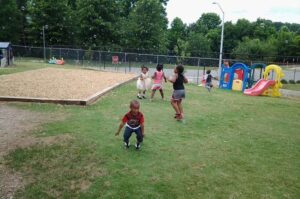
The Musical Freeze Game involves playing music while children dance and suddenly stopping it, prompting them to freeze in their position. This game is both fun and challenging.
The game enhances listening skills and self-regulation, as children must focus on the music and stop when the music does. It also helps improve balance and coordination, as they often have to hold challenging poses.
Try this: Use a variety of songs to keep the game interesting, switching between fast-paced tunes and slower ones to challenge children's listening and reaction times.
Making Homemade Instruments
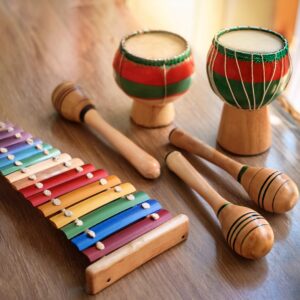
Creating homemade instruments, like shakers from rice-filled bottles or drums from empty containers, encourages children to be resourceful and inventive. This activity allows for creativity while teaching them about sound and the world around them.
This activity supports fine motor skills through cutting, gluing, and assembling instruments. It also enhances understanding of sound and vibration, teaches recycling and resourcefulness, and promotes collaborative work when done in groups.
Try this: Create maracas from beans and plastic eggs, tambourines from paper plates and bells, or a rain stick from cardboard tubes and rice.
Call and Response Songs
Call and response songs involve a leader singing a line and the children repeating or responding to it. This method is interactive and keeps children engaged.
This activity promotes auditory memory, listening skills, and language development. It helps children understand the concept of echoing and enhances their ability to follow directions and stay focused.
Try this: Songs like “Down by the Bay” and “The Green Grass Grows All Around” are great for this activity. You can even create your own call-and-response songs to fit different themes.
Sound Matching Game
The sound matching game involves creating sounds with various instruments or household objects and having children identify the source of the sound.
This game improves auditory discrimination, memory, and concentration. It also encourages critical thinking and problem-solving as children analyze and match sounds to their sources.
Try this: Use a variety of objects like keys, bells, drums, and whistles. Create a "sound box" where children take turns guessing which item produced the sound.
Lullaby and Relaxation Time
Lullaby and relaxation time is built around soft, soothing lullabies to help children wind down and relax. It can be incorporated into nap time or used as a calming activity.
This practice helps develop listening skills and provides a calming effect that aids in emotional regulation. It promotes relaxation, reduces anxiety, and creates a peaceful environment conducive to rest and recovery.
Try this: Songs like “Twinkle, Twinkle, Little Star,” “Brahms’ Lullaby,” and soft instrumental music are perfect choices for relaxation time.
Schedule a Tour at Primary Beginnings in Raleigh, NC
At Primary Beginnings in Raleigh, our teachers introduce a variety of musical instruments to children of all ages. From tinkering on the musical triangle to using their developing voices to sing, our classrooms are full of talent! If you’d like to learn more about Primary Beginnings or schedule a tour, contact our Spring Forest Rd school at 919-790-6888, Falls of Neuse Rd at 919-790-6888, or North Hills Drive at 919-785-0303, or fill out the form below today to get started!
